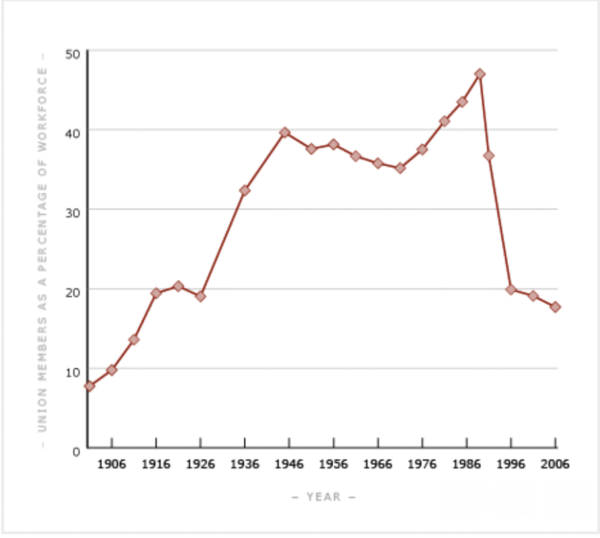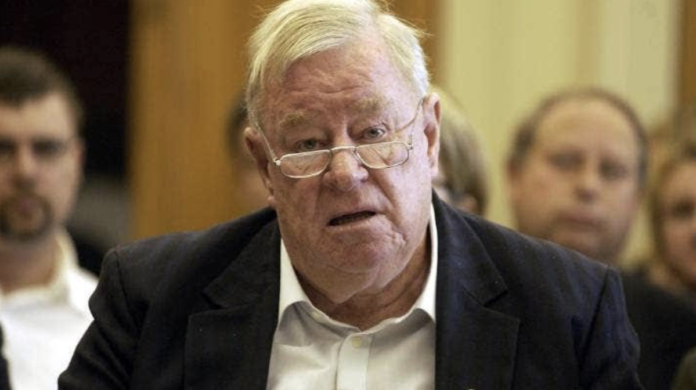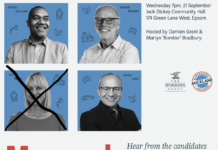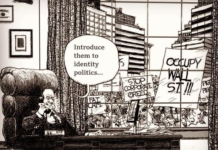In Aotearoa there was an historic collapse of private sector unionism in the 90s.
Ken Douglas was President of the Council of Trade Unions from 1987 to 1999.
This is what happened to union density over that time:

Percentage of union members
The end result literally put us back 70 years. In fact the graph understates the catastrophe – private sector density fell to 10%.
There was a sustained attack on unions over that period and it certainly wasn’t all Ken Douglas’s fault – but Aotearoa’s decline was greater than almost any other country – many of whom faced the same neo-liberal onslaught. Ken Douglas was widely criticised for his lack of leadership in fighting back against the attacks of the 1990’s. It led to a split in the CTU with the formation of the Trade Union Federation – whose members re-joined with the CTU in 2000 – after Ken Douglas left.
He also strongly supported the 4th Labour government (despite being a member of the Soviet Union aligned Socialist Unity Party), a government without which the National party attacks of the 1990s would not have been possible.
He was rewarded with numerous board appointments by Helen Clark government and a royal honour. Never quite figured out how a life-long communist knelt down in front of the Queen’s representative to get his “well done!” badge.
We have had many great union leaders in New Zealand. He wasn’t one of them.





If less than 20% of workers can be persuaded to join a union then either unions are doing a poor job, there is no longer a need for labour to be organized or today’s workers (warning: victim blaming follows) are just plain ignorant and deserve to be screwed over by their bosses.
Back when I started work (70’s) it was compulsory to join the union in many jobs & people had to apply to be exempted from joining if they did not like unions for any reason, That is 1 obvious reason for the drop in union membership. The country was run on the smell of an oily rag for many years with only high-profile unions able to achieve realistic wages for their members while most union members were provided enough to live on (living & housing costs were less then) while employers insisted the cupboard was bare although the shareholders & management prospered. Many people didn’t see any reason the keep paying union fees when their union appeared to be doing very little to help them although part of that was due to many workers not being sufficiently motivated (or financially secure enough) to take strong industrial action to push their employment requests.
As Martyn has repeatedly said the greater concentration of wealth now will eventually cause those with less to combine their resources to demand a fair share (I have provided a polite description although if history is any guide there is no guarantee that it will be a peaceful transfer).
We can see indications that unions are starting to come back in the USA so the same thing is possible here.
Whilst I don’t agree with everything you say Bonnie I really enjoyed your post.
Thankyou.
That most workers today are fooled into not openly embracing unions is a reason that the system opposing worker rights- including the so-called ‘Labour Party’- must be replaced in a revolutionary manner.
“including the so-called ‘Labour Party’- must be replaced in a revolutionary manner.”
By who?
“By who?”
By revolutionaries.
By people who actually care!!
It’s either a feast or a famine with Unions. They can be too powerful or too pathetic. The quality of the people running a union is paramount or they are either non effective or just a pain in the arse. In the 70’s I worked at the freezing works in the freezers at Whakatu. Hard work, horrific hours but enjoyed the time and was well paid. Those on the killing floor and in the carton gang were paid huge money at the time and the union’s were becoming powerful. By the time I went farming and was killing stock at the works in the 80’s, the unions seemed to become very militant and were a pain in the arse. Several times I can remember killing stopped for pathetic reasons, and unkilled livestock was sent back to farms at a huge loss to the farmers. The workers were very well paid but powerful unions would strike for minor reasons because they could. Whakatu and Tomoana works in Hawkes Bay were massive on today’s standards between them killing over 40000 lambs a day on occasion. In the end the farmers were sick of them, the government was sick of them( the unions) and the country was sick of them. It was a classic case of abuse of power. What we have now is the result of that abuse of power.
Agree New View it was never about good earnings or working conditions for the Union officials of that time.It was more a class war or if you like a cultural war.
The Unions were about sticking it up what they called the managerial class.They exercised their power to the extent it turned the person on the street against them and backfired badly.
Calling Ken Douglas out is cheap showing how divided the Union movement really was.In contradiction to “Union.”
Good stuff Mike.
There are some pretty ‘odd’ people who take knighthoods and other awards from the grasping royals despite their saying they are opposed to royalty and lots of them live here in Aotearoa. I would love to see a list of those who have been offered one and turned it down.
I think unions have been bad mouthed in the public arena for years, they cause trouble bla bla. There should be in all workplaces education about why it is so important to belong to a union, collective responsibility. Looking after all the workforce not just No. 1.
Richie McCaw comes to mind, having turned down a knighthood for kicking a ball around
McCaw reportedly turned down a knighthood but accepted the NZ’s highest honour of Order Of New Zealand which is supposed to be awarded for “outstanding service to the Crown and people of New Zealand in a civil or military capacity”.
And yes, for kicking a ball around.
I have also wanted to see such a list but we never will I suspect because maybe those who turn them down are more humble. Occasionally we learn of someone who said no thanks, and those people to me are the unsung heroes worthy of greater respect.
Knight and damehoods are a colonial anachronism only returned by Shonkey so he could get one.
obits are always ‘photshopped’ hagiography
not the one I saw on Norman Jones. Suitably called “An O-bith-uary.”
Back in the highly unionised nineties I was a passionate unionist, yet I used to wonder why we would suddenly find ourselves in the middle of a stop-work meeting over some little thing.
Simultaneously, there was a lot of media hype about the ‘unreasonable’ unions ”holding the country to ransom” over some ‘demarcation dispute’ or such, and we’d be made to look like we were ridiculous.
At those times, I’d be thinking about my work piling up, and be wondering why we didn’t seem to distinguish, and take on the ”real” battles and ”not sweat the small stuff” as would seem ‘sensible’.
I was very young. It took me a lot more years to understand the dynamic of competing interests, where holding the line is essential. Those small things were a part of an overall strategic game. Capitalism had not changed. The small would quickly mount up, be normalised into a new decrease for workers and increase for the management.
We were all friends, but we weren’t friends. We were working together towards the same end in regard to getting the work done, but the worker’s loss was the company’s gain and vice versa.
It was, in reality a crazy situation.
Our union was crushed during that time. Like so many others. Even though I was voting for the union, I didn’t really understand. That pull to be reasonable, and be reasonable and be reasonable was a part of an unhealthy desire to seek approval. It was certainly not shared by the management because undermining conditions and keeping wages low was in their interests and they never forgot that.
“Capture” has many faces. It seems to me now, that a deep understanding of all of the faces of capture, along with self-awareness of our personal weaknesses and how they can and will be leveraged against us by those whose agenda does not include, or worse, runs counter to our own is vital.
Thanks Mike for the brief and straightforward facts. People should be recognised for what they do or don’t. Lou Reed again – phrase ‘You shall reap what you sow’. He reaped well from poor cultivation, but leaving failed crops in the future. Almost as if we had been sprayed bya number of weed-killers.
The types of weed killer include contact, systemic, residual, selective and non-selective. It’s important to note that before buying any type of weed killer, selecting and using the wrong type on your lawn or affected area can cause serious harm.
“life long communist” is obviously incorrect Mike, he abandoned a marxist world view long before he revealed that change to most of his comrades in the SUP and the public–some of the Wellington crowd likely knew exactly what he was up to. He helped pull off one of the major class errors of the late 20th century, namely the destruction of the Federation of Labour and the instigation of the class collaborationist NZCTU.
His other main crime once ensconced in the NZ Council of Trade Unions, along with the state union leaderships, and some of the private sector ones, was pursuing Tripartism–or “Partnership” as the PSA still calls it. At peak neo lib union busting time, the employing class wanted no less than the total derecognition and destruction of NZ unionism. Cuddling up to the bosses in a three way–Unions, Govt., Employers–was never going to have a positive result for working class people.
Mr Douglas supported the ANZAC Frigate build in 1988 and bosses plans when ever he could get away with it on the basis of tripartism. Ken thought he was a futurist with a brilliant strategy for industry unions and consolidation, and “positive engagement” with the Govt. & Employers. but he turned out to have got it horribly wrong at best as Treasury graphs show how wages and productivity seriously parted company after 1991. The other explanation hardly bears thinking about–that he was a deep plant and bosses agent.
HE! TIGER, STAND UP STRAIT, DONT GET KNEE WEEK.
Strait?
Gosh really?
Mike Treen ; when and if you get to live as many years as Ken Douglas, through a Depression, growing up as a true working class lad as a driver, a world war, the years of Muldoonism, the 1980s neo liberal experiment and the Consequences of the ECA, along with being a true internationalist with huge influence in the trade union movement, I hope people will be more generous to you.
Ken,knew, this new labour construct of white collar workers, did not have their being to stand and fight,as their blue collar workers would..
Darion,time Ken gone to his reward,outside old s.u.p and others. knowing.
……………………………………………………………………………………………………S
Darien Fenton,
Yes!!
Bob the first.
A General Strike against the reactionary National Government and its ‘smash the unions’ agenda was on the cards.
I always thought Auckland should have led the way. We had a massive demo. A General Strike was proposed at Aotea Square at the end of the march but it wasn’t supported by union leaders; notably Bill Anderson (another SUP-er).
As they say; “The crisis of humanity resolves itself down to a lack of leadership”. In this case the result was a near fatal blow to private-sector unionism.
Only public sector unions survived relatively unscathed (but our hard-won union rights were severely restricted).
Never. Been the first of many baton scares, looking today.Choose your care knowing stand.
ALWAYS, WHERE.the bus stop knowing UNION STREET.
Mike segrdation, of workers, new place now go on strike, what adjust your tie or stand.Engels,
Engel,what a care knowing of Marx, their knowing, what a thing.
Ken Douglas, most have not a clue of who the person was.
Yes Jim totally agree.
Darrien Fenton; You are the problem with the current union movement and the lackies at the CTU – What happens when one of the partners stops holding your hand?- where do you go? – I’ll stand by Mike Treen and his kind before a sell out like you.
As for YOUR Labour party – class collaborationist like Ken Douglas. There are others still breathing.
Living through the Reagan Thatcher Freidman Douglas revolution was to be totally discombobulated. Those guys tactically were the ultimate Leninist revolutionary exponents. Get them off balance, hit them again, again and again til they know not which way is up.
Don’t blame Ken, he never stood a chance. If he runs into Lange in the afterlife I hope he dedicates eternity to boxing his ears.
Jim, Jim please stake a claim out for me.